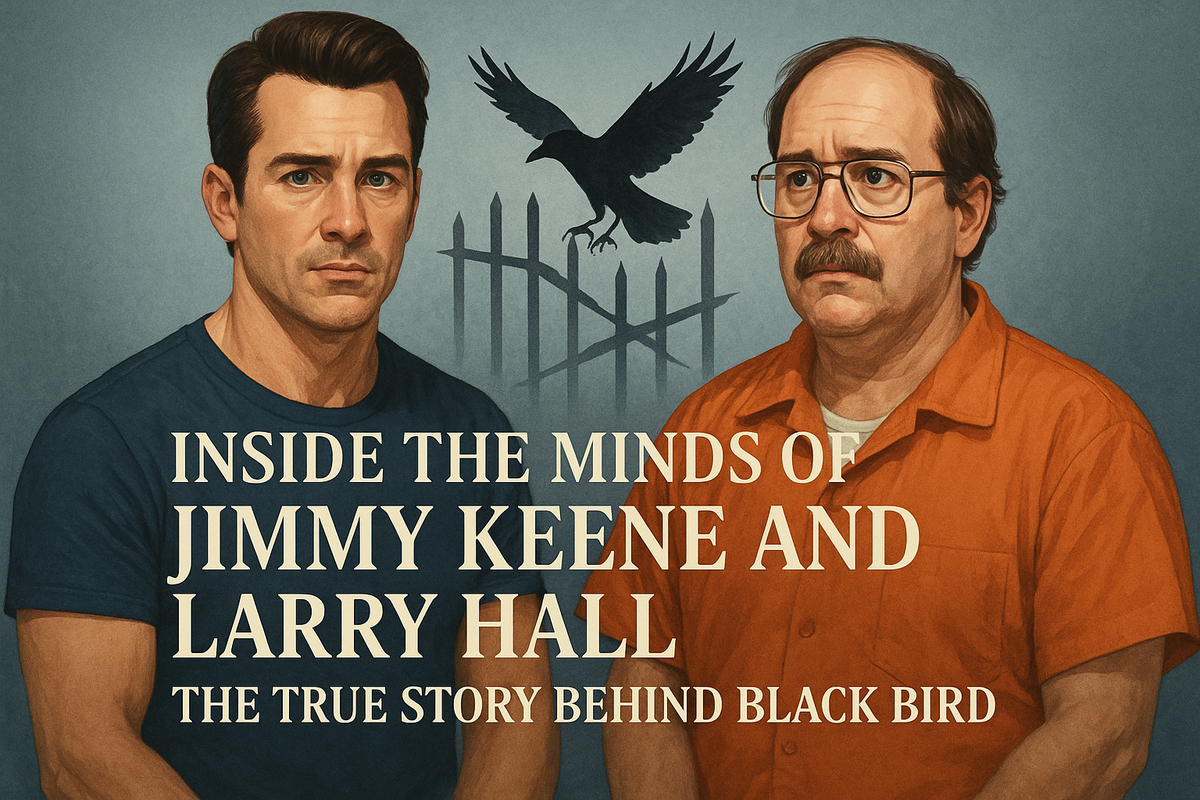The Killer and the Infiltrator: Unmasking the Real Story Behind Black Bird
Let’s dive into the lives of these two men—one tasked with hunting a monster, and the other possibly being one. - Rafael Benavente

Inside the Minds of Jimmy Keene and Larry Hall: The True Story Behind Black Bird
By Rafael Benavente
Apple TV’s gripping limited series Black Bird captivated audiences with its psychological tension and true-crime edge. Based on real events, the show tells the story of Jimmy Keene, a charismatic drug dealer offered a life-changing deal by the FBI, and Larry Hall, a suspected serial killer whose soft-spoken demeanor hides disturbing secrets.
But how much of Black Bird is true? And where are the real Jimmy Keene and Larry Hall now?
Let’s dive into the lives of these two men—one tasked with hunting a monster, and the other possibly being one.
Jimmy Keene: From Prisoner to Hero
In the 1990s, Jimmy Keene was living large in Kankakee, Illinois. The son of a respected police officer, Keene built a lucrative life dealing drugs—primarily marijuana and cocaine. By his mid-20s, he had made millions, living in luxury. But the fast life caught up with him in 1996 when he was arrested and sentenced to 10 years in federal prison without the possibility of parole.
Then came an unexpected offer.
The FBI approached Keene with a covert mission: transfer to a maximum-security psychiatric prison in Springfield, Missouri, where a suspected serial killer named Larry Hall was being held. The goal? Befriend Hall, earn his trust, and get him to confess to additional murders—specifically, the location of missing bodies. If Keene succeeded, he would earn an early release.
In Black Bird, this operation is dramatized with Taron Egerton playing Jimmy. The show captures both Keene’s charm and his internal conflict as he walks the tightrope between loyalty to justice and self-preservation.
Larry Hall: The Chilling Suspect
Larry DeWayne Hall was a Civil War re-enactor and cemetery groundskeeper from Wabash, Indiana. He was socially awkward, often bullied, and suffered from mental health issues. His twin brother, Gary Hall, was his only close friend—but even he suspected Larry of dark deeds.
In 1993, Larry Hall was convicted of kidnapping 15-year-old Jessica Roach in Illinois. While only charged in that case, Hall is suspected in the disappearances and murders of 30 to 40 women across the Midwest. He often targeted vulnerable young women near Civil War reenactment sites, where he frequently traveled.
Though Hall initially confessed to several crimes, he later recanted. His confessions were often disjointed, leaving investigators unsure what was truth and what was fantasy. The FBI hoped that placing Keene in proximity would yield clearer evidence.
What Keene uncovered in prison was terrifying: Hall seemed to speak in riddles about dead girls, grave digging, and what he’d “dreamed” about doing. According to Keene, Hall confessed to killing Jessica Roach and hinted at several other victims, even drawing crude maps to their burial sites.
Unfortunately, the deal almost fell apart when Keene lost his temper and confronted Hall—blowing his cover just as Hall began to open up. Although Keene didn’t get every detail the FBI wanted, he had gathered enough intel to justify Hall’s continued incarceration.
Aftermath: Where Are They Now?
Jimmy Keene was released from prison shortly after the mission. He co-wrote the memoir In With the Devil, which became the basis for Black Bird. Since then, Keene has reinvented himself as an author, public speaker, and occasional consultant on criminal behavior and justice reform.
He frequently gives interviews, participates in crime documentaries, and has used his notoriety to advocate against corruption and wrongful imprisonment. He remains proud of his unusual second chance at redemption.
Larry Hall, on the other hand, remains behind bars—still serving a life sentence at the Federal Correctional Institution in Butner, North Carolina. Despite strong suspicions and circumstantial evidence connecting him to multiple murders, Hall has never been tried for crimes beyond Jessica Roach’s abduction.
He continues to deny most of his earlier confessions, often claiming he made them under pressure or while mentally unstable. No new charges have been successfully filed, and many families of suspected victims remain without closure.
In one particularly haunting moment from Black Bird, Hall describes dreams of strangling girls—echoing actual taped confessions made years ago. The ambiguity around his truthfulness continues to frustrate investigators.
The Legacy of Black Bird
What makes Black Bird so powerful is not just its factual basis, but the emotional and moral complexity it explores. Jimmy Keene isn’t portrayed as a perfect man. He was a drug dealer who broke the law and profited from it. But when given the chance, he risked his life to potentially stop a serial killer.
And Larry Hall? He embodies the unnerving contradiction that some of the most dangerous individuals aren’t violent or aggressive in appearance—they’re quiet, reclusive, and deeply manipulative.
In portraying both men, Black Bird does more than dramatize a true-crime tale. It challenges us to consider what redemption looks like, how justice is pursued when evidence is murky, and how thin the line can be between confession and deception.
Final Thoughts
Jimmy Keene’s journey from drug kingpin to unlikely FBI operative is stranger than fiction—and yet, entirely real. Larry Hall remains one of the most enigmatic and unsettling figures in modern criminal history: possibly responsible for dozens of unsolved murders, yet only convicted once.
Black Bird gives voice to the victims lost along the way and reminds us that the pursuit of truth often lies in the grayest of moral zones.
Sources & Further Reading:
- In With the Devil by James Keene and Hillel Levin
- FBI interviews and court transcripts from the Roach kidnapping case
- Public statements and media appearances by Jimmy Keene
By Rafael Benavente
